Defecting Iranian Chess Master Meets Spanish Prime Minister

An Iranian chess player, who defected to Spain after she competed without hijab, has met with Spanish Prime Minister Pedro Sanchez in Madrid.

An Iranian chess player, who defected to Spain after she competed without hijab, has met with Spanish Prime Minister Pedro Sanchez in Madrid.
Sarasadat Khademalsharieh arrived in Spain in early January after having made a bold statement in Kazakhstan's capital Almaty, where she had participated in the FIDE World Rapid and Blitz Chess Championships without wearing the compulsory hijab.
"How much I have learned today from a woman who inspires me," Sanchez posted on his Twitter account after hosting Khadem at his official residence Wednesday.
"All my support to women athletes. Your example contributes to a better world," he added.
In footage provided by the prime minister's office, Khadem is seen chatting with Sanchez without wearing a hijab. They later appear to engage in a game of chess.
In the past four years, dozens of Iranian athletes have defected to other countries in objection to Islamic Republic’s restrictive policies, including compulsory hijab for women during matches and a ban on competing against Israeli athletes.
Anti-regime protests against clerical rulers have been going on for more than four months when a 22-year-old Kurdish woman, Mahsa Amini, was killed in police custody for wearing "inappropriate attire".
The US-based Human Rights Activists News Agency (HRANA), one of the groups that monitors and publishes daily statistics about the protests, said Tuesday that 525 protesters have been killed from September 17 to January 23, including 71 children.
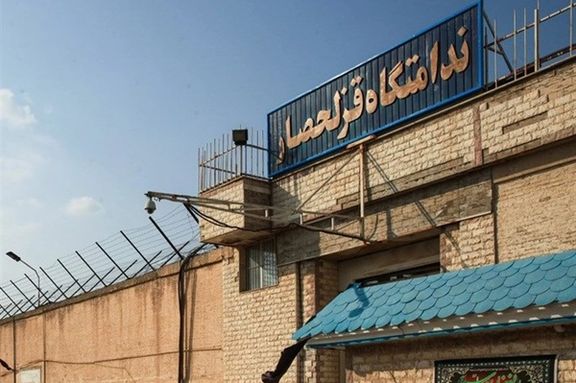
A protest gathering by families of drug crime convicts, who are sentenced to death, has turned violent with the intervention of prison guards in Karaj west of capital Tehran.
The US-based Human Rights Activists News Agency (HRANA) reported that the families of prisoners held a gathering in front of Ghezel-Hessar prison Wednesday, and some of them were injured when prison officers used violence.
Holding banners and handwritten placards, the families demanded a lesser punishment for those accused of drug crimes and a halt to carrying out their death sentences.
Families of death row prisoners have regularly held protests in the past months. They had previously gathered outside Iran's Judiciary headquarters in Tehran on January 14 and 16.
Based on reports by human rights organizations, a significant number of executions have been carried out in Iran are related to drug crimes.
So far, the total number of executions in 2022 has not been published, but the Oslo-based Iran Human Rights Organization previously announced 333 people had been executed in 2021; more than a third related to drug crimes.
The UN special rapporteur for human rights on Iran Javaid Rehman warned early September about the doubling of the number of executions in Iran in the first half of 2022 compared to the previous year. He described the number of death sentences "worrying", especially executions related to drug crimes.

A sociologist in Iran has characterised the Islamic Republic a “fundamental evil,” describing the nationwide uprising as “the revolution of good against evil.”
Iranian Academic Mostafa Mehraeen said at a gathering of sociologists that Iran is facing an implosion and a civilizational revolution because of the people’s experience in the years before and after the 1979 Islamic Revolution. He called on officials to think about why the Islamic Republic has been turned into a fundamental evil during the past four decades.
Many Iranian academics and commentators have become increasingly vocal in their criticism of the authoritarian regime, its mismanagement of the state and deadly violations of human rights in recent weeks.
Meanwhile, Mehraeen criticized some of his peers and firebrand cleric Ahmad Alamolhoda for saying that no one was killed by security forces during the uprising and that the movement in Iran was motivated by sex and alcohol. He said those who have made those false comments are “ignorant.” Mehraeein further accused Iran’s rulers of dishonesty and said: “They have been lying for 40 years.”
He added that claims by officials about the protest movement being a riot by gunmen was also a lie.
Mehraeen questioned the Islamic Republic for regarding itself as a "sacred order" and said, "Yes, you were sacred only in the first year after the revolution."
The sociologist can well put himself in danger of getting arrested, as dozens of journalists, artists and writers are currently in prison.
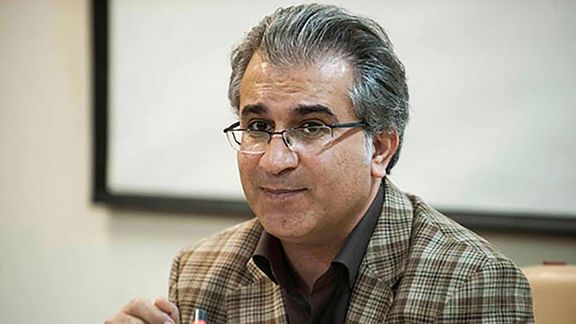
In another sharp remark, Mehraeein spoke about IRGC Commander Hossein Salami ordering Iranians "Not to take to the streets from tomorrow!" Mehraeein addressed Salami: "Do you own the nation? Do you own their bodies? Do you own the streets? Who are you and what is your status?"
He also recalled a move by members of the Islamic parliament who asked the hardliner Judiciary to execute detained protesters and said: "You foolish members of the parliament, you are supposed to be representing the people. What do you mean by saying that they should be executed?" He reminded the regime: "A political system is not all about the noose and hanging. It is not all about police, batons and repression!"
Mehraeein pointed out that one of the characteristics of the current protests is that they do not seek to disrupt the social order. "The protesters love their country and do not wish to start a civil war. That is why the conflict in restive provinces never turn into civil war because the ethnic people in those provinces seriously avoid any armed confrontation with the security forces. They want a revolution without bloodshed," he said.
During the past weeks, the Iranian Sociological Association has been holding several conferences to discuss the implications and the outlook of the Iranian protests that have been rocking the country for four months.
In his discussion about the pathology of civil protests, Iranian sociologist Ali Jafari separated the notion of culture from the idea of fabricated culture. For instance, when women reach a consensus on an issue such as hijab, that is culture, but ideological governments fabricate their own ideas as some kind of culture and try to impose that on the people. This is what we call fabricated culture, he said, which damages the society's cultural and social order.
The Association's website also featured an article by jailed sociologist Saeed Madani, written before the current protests, which argued that some social movements start without pre-planning or coordination.
Iranian sociologists had warned for years about the chances of protests similar to the Woman, Life Freedom movement, suddenly flaring up, but the regime never believed them. Even now when they have realized the predictive nature of sociological studies, they still keep academics such as Madani in jail and continue interrogating them and asking: How come you knew this and we didn't.
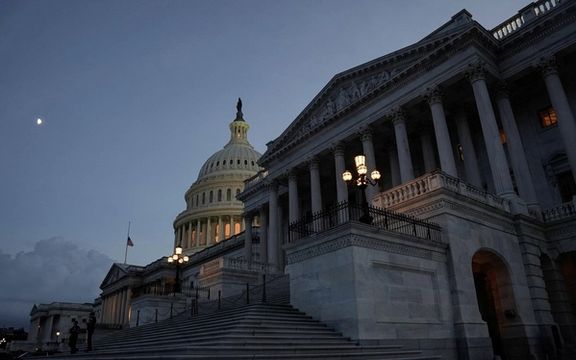
The US House overwhelmingly approved a resolution Wednesday expressing solidarity with Iranian protesters who have risen up against the clerical regime in Tehran.
The 420-1 vote marked the latest round of international condemnation against Iran’s government, which has used brutal force to crack down since the September death of 22-year-old Mahsa Amini in ‘morality police’ custody.
“It is vital that we in the US House of Representatives, a body that is among the greatest symbols of freedom and democracy around the world, stand with one voice to affirm our support for the brave Iranian people,” Rep. Claudia Tenney, R-N.Y., said during floor debate Wednesday.
At the same time, exiled Iranian Prince Reza Pahlavi told Sky News in an interview Wednesday that he will soon visit different capitals to lobby for support for the protest movement and demand more pressure on the Islamic Republic. He is the most prominent of several individuals in the diaspora who have come to be seen as representatives of the protest movement.
The move in the US Congress followed a similar vote in the European Parliament last week, in which an overwhelming majority voicing support for the protesters asked the European Union to designate the notorious Revolutionary Guard (IRGC) as a terrorist organization.
The resolution was first introduced in the last Congress by a bipartisan group of lawmakers and was revived earlier this month — reflecting a rare point of consensus. Its passage also came days after the US, Europe and the United Kingdom imposed a series of fresh sanctions on dozens of Iranian officials and organizations, including many affiliated to the IRGC that controls most of the security forces responsible.
The US administration and European allies have adopted a tough posture toward Tehran, demanding an end to human rights violation and freedom for all prisoners. They have also condemned a dangerous move by the Iranian regime of supplying kamikaze drones to Russia that have targeted civilian infrastructure.
The Biden administration that spent 18 months negotiating with the Islamic Republic to revive the 2015 nuclear accord, the JCPOA, has said it is not focused on those talk anymore and instead is following the protests and supporting the Iranian people.
But the administration has not abandoned its strategy of negotiations with the regime to restrict its nuclear program, although any agreement seems remote at this time.
At least 517 protesters have been killed and over 19,200 people have been arrested, according to Human Rights Activists in Iran, a group that has closely monitored the unrest. Iranian authorities have not provided an official count of those killed or detained.
The protests mark one of the biggest challenges to Iran’s theocracy since the 1979 revolution — and the reaction from the government has been severe. Security forces have used live ammunition, birdshot, tear gas, and batons to disperse protesters, according to rights groups.
“We want the Iranian people to know that we see you. We know the risk you’re taking and the danger that you face,” Rep. Gregory Meeks, D-N.Y., ranking chair of the House Foreign Affairs Committee, said on the House floor. “Stay strong.”
He added, “Stay strong as freedom will always win over tyranny.”

The Iranian regime claims that a man who pleaded to see his daughter before execution “faked” his story, but many see it as a regime hoax to discredit the opposition.
An audio file emerged on social media last week in which a man identified as Firouzi or someone posing as him said he had only one wish, to be allowed to see his baby daughter one more time before being executed. He also said he was being tortured to make a scripted “confession” but that he knew he would be executed whether he complied or not. He said he was arrested during recent protests.
Several Iranian television channels abroad reported on the case, including Iran International, with available photos showing him badly tortured.
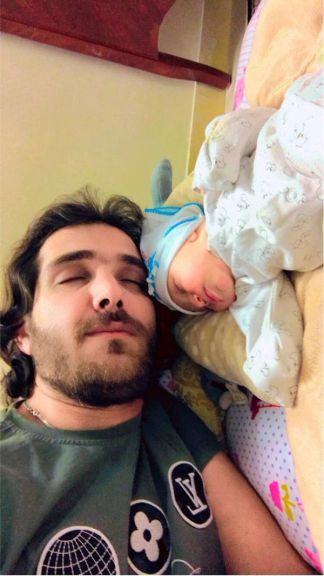
Then on January 22 Iran’s Judiciary issued a statement and claimed that no one by the name of Hassan Firouzi had ever been arrested.
Its official Mizan News Agency made a further claim Wednesday that Hassan Firouzi, was arrested while fleeing the country.
Mizan also published several photos of the detained man in an empty plane with Qeshm Air logo visible in the cabin. Mizan claimed that Firouzi had faked his arrest and torture to escape from his creditors and carried out his plan with the help of “hostile foreign-based media” and provided them with his fake torture photos and stories.
Pro-regime media and social media are currently abuzz with claims that other cases of dead protester and torture are similarly fake.
The social media account of Iran Human Rights Society which is reportedly affiliated to the Mujahedeen Khalq Organization (MEK) last week claimed that Firouzi had gone into a coma resulting from further tortures because of sending out the recorded message. It was also claimed that his family had been taken to a hospital to see him for the last time.
Some journalists and social media activists such as Masoud Kazemian became suspicious of the case for several reasons including the leaking of unique and gruesome photos of a tortured Firouzi and his audio file but no records of his trial or sentencing, as social media reports were claiming. There was also no trace of his family and friends speaking about his case.
A human rights activist based in Europe who in December established a Twitter account, Political Sponsorship Iran (@PoSpoIr), as a centralized hub for sponsorship of political prisoners told Iran International that Firouzi case is being used by the regime’s propaganda machine to discredit the international effort by hundreds of European lawmakers and activists to prevent the torture and execution of Iranian protesters.
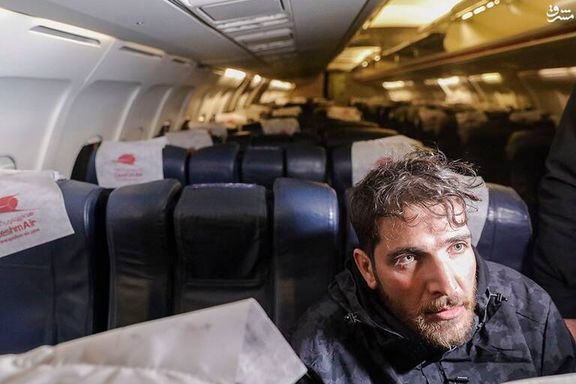
“Hassan Firouzi has three French, one German, one Canadian and one Danish sponsor because his reported circumstances seemed to be exceptionally dire. Planning this and making his case look fabricated is psychological war,” the activist behind @PoSpoIr said.
“You don’t win all the time in a war. Firouzi’s case, if it is really a hoax, does not rule out the authenticity of hundreds of other cases or stop parliamentarians who are well-informed about the regime’s dirty tricks from volunteering to take political sponsorship of other prisoners or pursuing the cases they have already accepted,” she added.
There are also some people who think a Hassan Firouzi may have really been arrested for protesting, tortured and sentenced to death, and again tortured to say he had never been arrested and had only faked the whole story.
“We cannot confirm, based on the extant information, that whether this person’s life is in danger or not,” Seda-ye Shahrivar, a Twitter account dedicated to the news of recent protests, said about the case while pointing out that the situation could result in “lack of trust and confusion over the conditions of political prisoners” by creating doubt about their veracity.
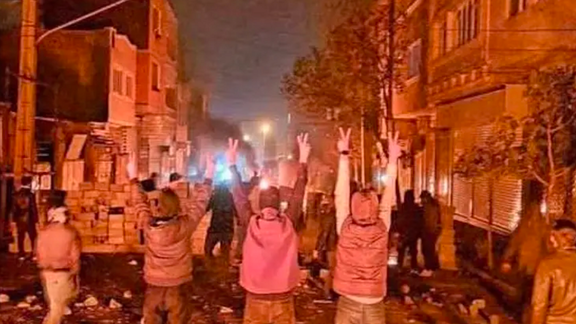
The Islamic Republic continues to use a wide range of punishments for anyone who protests its conduct, but the range of its torture techniques is increasing during the current protests.
The regime’s security forces use violence against protesters on streets, kicking them violently, beating them with batons and shooting at them, but the psychological and physical torture that they exert on detained protesters are harsher and unrelenting.
The regime’s agents beat protesters so badly that in some cases when they appear in court the scars and bruises are so obvious that people can easily understand confessions were made under duress.
The Center for Human Rights in Iran said December 6 that there have been many reports of detained university students being tortured and sexually abused while in state custody. Soha Mortezaei, a former Tehran University female student, who has been repeatedly arrested for engaging in peaceful activism, was physically and sexually assaulted while being transferred to Evin prison after her arrest. “Officers tied Soha’s right hand to the top of one seat and her right leg to the top of another seat while suspended, she was beaten and sexually abused by a female officer,” reported the University Students Trade Unions Council on November 27.
Most of the protesters who are being kept in main prisons are mainly subjected to psychological torture but reports of physical torture get more attention from the public and rights groups. The detainees are constantly threatened to be killed or raped and some of them are victims of white torture, in which prisoners are kept in solitary confinement without any human contact for very long periods of time.
Some protesters, who were usually injured during their arrests or became ill inside prisons, are deprived of medical care or treatment for their wounds as a form of torture. The protesters who are suffering from chronic conditions and need daily medication are put under pressure by not giving them their medicines.
Faraz Haghighatjou, a resident of Shiraz and a member of the oppressed Baha’i religious group, who was arrested during protests in December, once called his family and asked for his medicines and warm clothes but his family could not even find out where he is being kept.
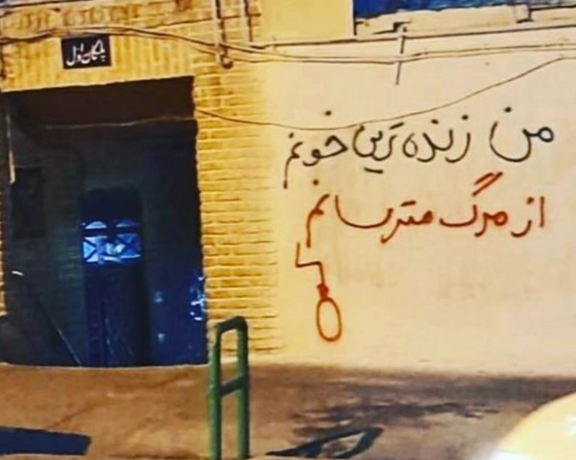
Imprisoned civil and human rights activist Narges Mohammadi last week recounted harrowing details of what is happening inside the women's ward of Tehran’s notorious Evin prison. She said almost all 60 female prisoners there have experienced "terrible inhumane tortures". These women spent from several months to about two years in solitary confinement, some without any human contact.
Another report released by an activist group earlier in the week says 16 young people arrested in Urumieh in November, including several minors, have been tortured and threatened with rape to incriminate each other. The group said that IRGC’s intelligence organization in West Azarbaijan Province has been torturing these young people to ‘confess’ against each other and say they are in contact with foreign intelligence services.
The protesters who were executed by the regime on trumped up charges in December were also said to have confessed to crimes they did not commit under physical and mental torture in prison.
A victim from the religious city of Mashhad in northeastern Iran, said she and eleven others were stripped in front of male officers and then forced to squat jump while the officers “frenziedly laughed.” Others have also said officers had groped their backsides and squeezed their breasts during arrest and interrogations. Many say they were threatened with rape or even rape of their family members.
Armita Abbasi, a young woman of 20, was reportedly raped brutally after being arrested on October 10. She was taken to a hospital in Karaj on October 18 by security forces with multiple injuries including rectal bleeding and evidence of repeated rape. Reportedly, they tried to pressure the doctors to attribute the rape trauma evidence to a time prior to her arrest.
Influential Sunni cleric Mowlavi Abdolhamid in his Friday sermon December 23 referred to reports of rape and torture of detainees. In a tweet on December 5, Abdolhamid had said the accounts of sexual assault on female detainees to humiliate them or to force them to make false “confessions” against themselves corroborate the allegations made by the media.
In a report on December 21 entitled “Brutal Repression in Kurdistan Capital”, Human Rights Watch said it has documented serious abuses, including sexual harassment and assault against detainees.
Such incidents have been reported from detention centers, prisons, and sometimes in places outside the official system such as warehouses out of town in several major cities including Esfahan, Rasht, Tehran, Karaj, Bandar Abbas, Ahvaz, Tabriz, Sanandaj, Amol, and Mashhad.
The torture of prisoners is not limited to the protesters arrested in the current wave of nationwide rallies ignited by the death of 22-year-old Mahsa Amini. The regime is known for its inhumane methods regularly reported by human rights groups.
In a letter by Sepideh Kashani, one of the ecologists and environmentalists detained since 2018 based on accusations of spying for foreign governments, said her interrogators tortured and threatened her with sexual assault for over 1,200 hours during the eight months that she was held incommunicado. She said that her interrogators forced her to stand for hours and was not even allowed to lean his head against the wall. She added that she was being interrogated in a room whose walls were covered by the blood of other protesters.